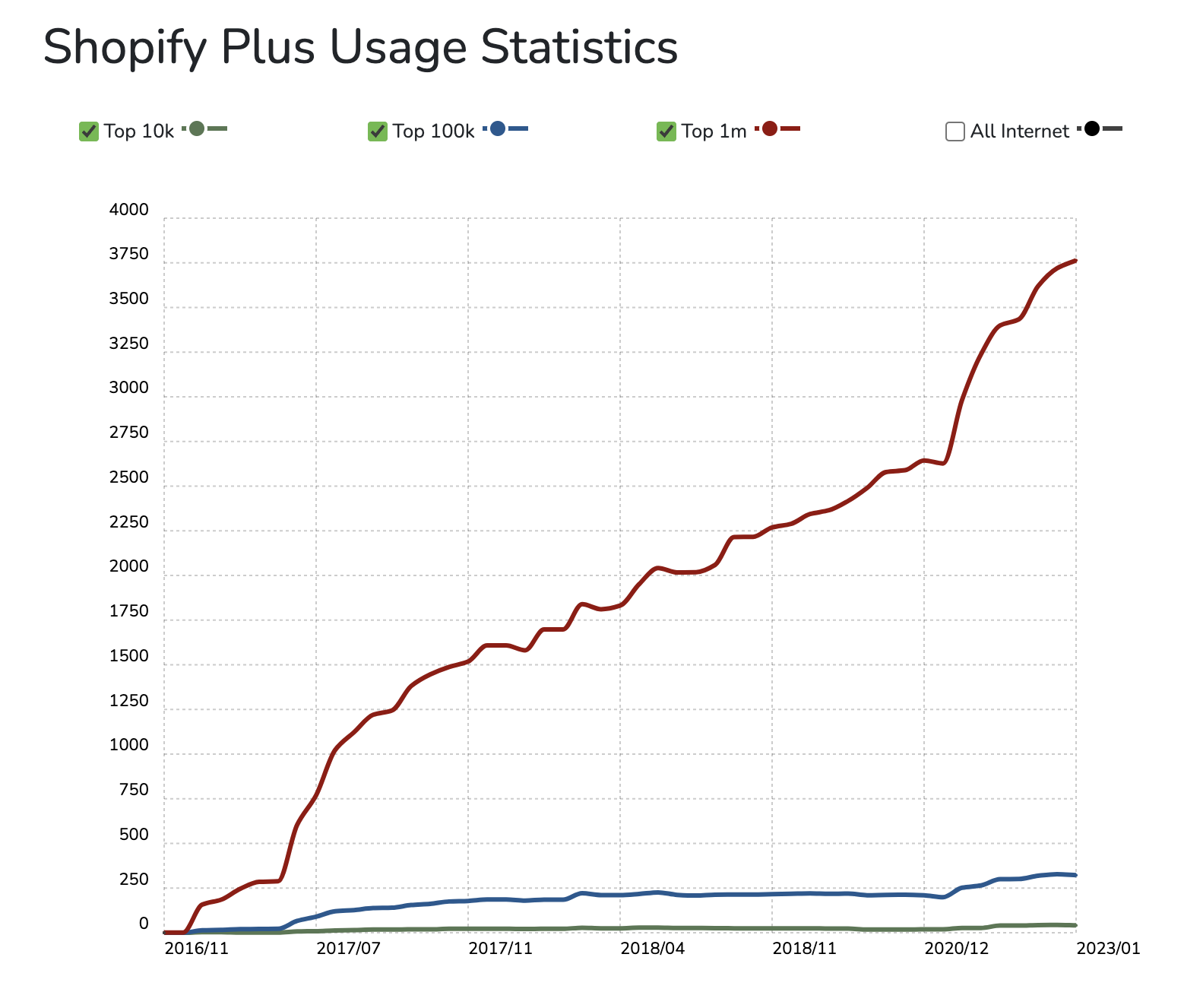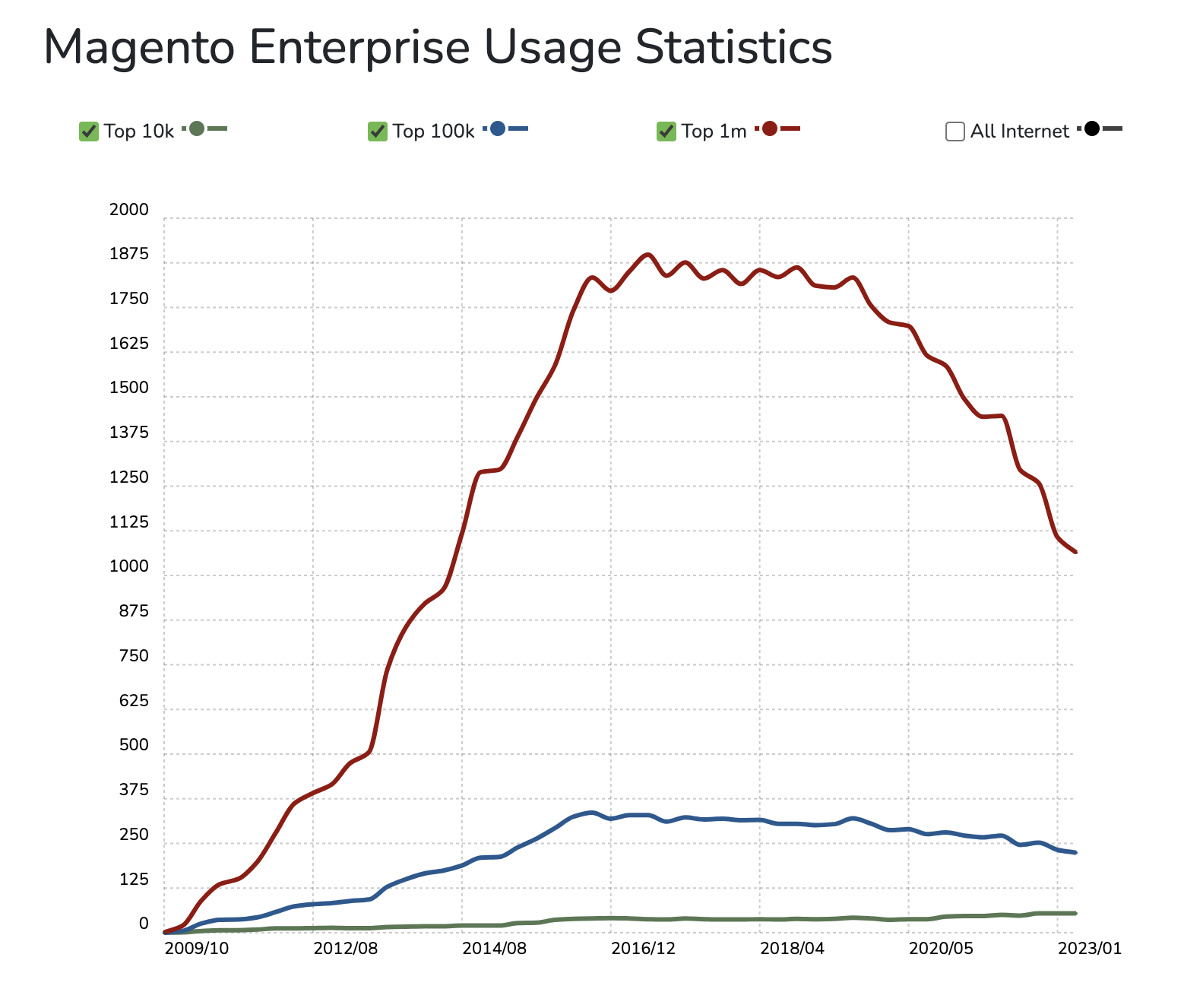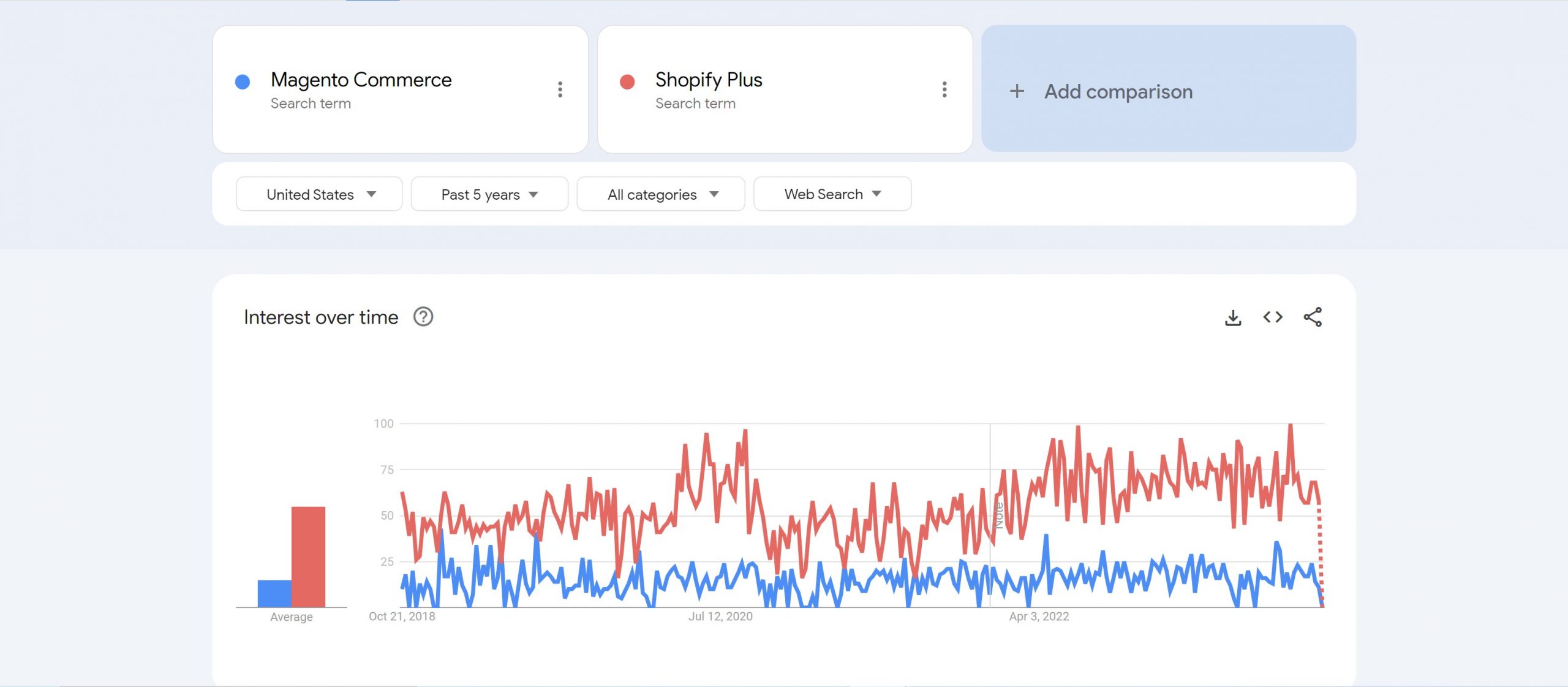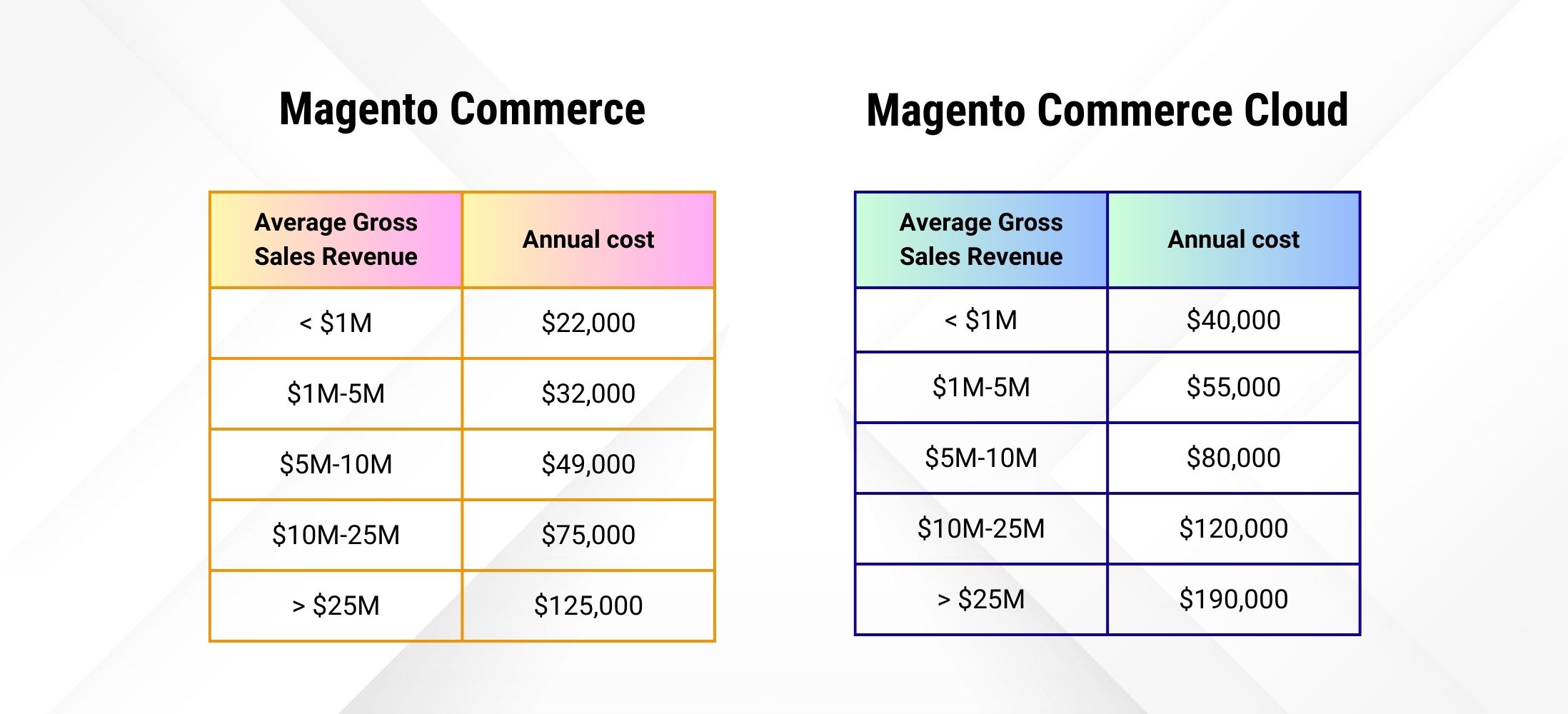When selecting an e-commerce platform, it is critical to evaluate your company’s specific requirements. Shopify Plus vs Magento (Adobe Commerce) stands out as the industry’s “kings” for large e-commerce or B2B firms. Both platforms provide extensive features and functionality, as well as the flexibility and scalability required for a large-scale online business.
In this detailed blog post, we’ll analyze Shopify Plus vs Magento to help you decide which platform is ideal for you. At the beginning of this post, we’ll provide a summary that allows you to quickly get an overview of each platform. From there, you can explore each comparison part in detail to make an informed decision on which platform is the best fit for your online store.
Shopify Plus vs Magento (Adobe Commerce) Overview
Shopify Plus
Shopify Plus is a highly scalable enterprise-level e-commerce platform that provides businesses with powerful tools and features to help them grow and scale their online stores. Targeted at mid-to-large businesses, Shopify Plus is known for its intuitive interface, quick setup, and extensive customization options.
Some of the popular websites that use Shopify Plus include Gymshark, Kylie Cosmetics, Staples, Heinz, Rebecca Minkoff, Kash Beauty, Bombas, Olly and many more.
According to recent Builtwith data, Shopify Plus is on the rise, with an increasing number of websites among the top 1 million domains showing higher expenditure. This surge since 2020 reflects the platform’s growing popularity across diverse industries and business sizes.
In 2023, Shopify Plus has over 42,038 active stores, making it a popular choice for businesses seeking an efficient and user-friendly e-commerce platform.

Magento (Adobe Commerce)
Magento, also known as Adobe Commerce or Magento Enterprise, is a highly customizable e-commerce platform that offers businesses the flexibility they need to tailor their online stores to meet their unique needs. Targeted at mid-to-large businesses, Magento is known for its open-source architecture, which allows for extensive customization and flexibility.
Some of the popular websites that use Magento include Christian Louboutin, Coca-Cola, Olympus, Land Rover, Byredo, Helly Hansen, Paul Smith, and many more.
Builtwith’s data reveals that Magento exhibited stable usage statistics from 2016 to 2019, but since 2020, a noticeable decline suggests potential competition from newer, user-friendlier e-commerce platforms. Estimated in 2023, Magento has over 4,829 active stores worldwide.

Google Trends: Shopify Plus vs Magento (Adobe Commerce)
According to Google Trends data from the last five years, the number of searches for Shopify Plus is approximately three times higher than that of Magento. This suggests that Shopify Plus is a more popular option among businesses seeking an enterprise-level e-commerce platform.
However, this data doesn’t necessarily indicate which platform is better suited for your specific needs. So, we’ll take a detailed look at both platforms’ features, pricing, scalability, and more to help you make an informed decision.

Summary: Shopify Plus vs Magento (Adobe Commerce)
Shopify Plus and Magento are two prominent e-commerce platforms, each offering unique advantages for businesses. Shopify Plus provides a hassle-free, hosted solution, with a user-friendly interface and a scalable pricing model that accommodates various business sizes.
In contrast, Magento offers the flexibility of self-hosting, allowing businesses to have more control over their site’s security and functionality. It comes with a rich set of features and a supportive developer community.
Pricing Comparison

When considering the pricing models of Shopify Plus vs Magento, it’s important to take into account the upfront costs, ongoing fees, and other financial factors. Let’s examine how these two platforms compare in terms of their pricing:
Upfront Costs
Shopify Plus monthly subscription fee varies based on specific business needs, ranging from $2,000 to $40,000 per month with a minimum one-year contract. Once monthly sales revenue exceeds $800,000, the pricing shifts to a revenue-based model, charging 0.25% of monthly revenue, capped at $40,000. This covers platform features, hosting, and support
- Pricing ranges from $2,000-$42,000 per month ($24,000-$504,000 per year) based on your revenue.
- This includes hosting and support, but transaction fees must be paid on top of the monthly fee.
Whereas, Magento offers two pricing plans: Adobe Commerce Pro and Managed Services. Due to our estimation, Managed Services starts at $40,000 per year goes up to $190,000 per year, and includes hosting and support. The Adobe Commerce Pro, on the other hand, requires a one-time licensing fee of $22,000 if your gross sales revenue is less than $1 million, and can cost up to $125,000 per year.
However, hosting and support are not included, and you’ll need to handle them separately. If you choose to use a third-party hosting service for Adobe Commerce, you may face expensive hosting fees. It’s important to select a reliable hosting company and package based on your store’s traffic. Unexpected spikes in site visitors can cause your site to crash if your server can’t handle the traffic.
- Pricing ranges from $22,000-$125,000 per year based on your revenue.
- This cost does not include hosting and support, but there are no transaction fees.

Transaction Fees
Shopify Plus charges a transaction fee for each sale, with rates ranging approximately from 0.3% to 0.15% based on the pricing plan selected. However, you can decrease this fee by using Shopify Payments, which provides the most affordable credit card rates among all plans. Shopify Payments’ rate is based on the selected plan, and it may be negotiable for businesses with strong sales volume and merchant history.
There are three payment processing options available:
- If you solely use Shopify Payments, Shopify will charge you for all Online and In-person credit card fees.
- If you utilize both Shopify Payments and a third-party processor, you may pay a low rate for third-party transactions, depending on your location.
- If you exclusively use a third-party processor, you will pay your processor fees, in addition to a 0.15% to 0.30% transaction fee to Shopify for security and compliance expenses.
On the contrary, Magento does not charge transaction fees.
User-Friendliness and Setup Process Comparison
Setup Process

Shopify Plus has a straightforward setup process, with a user-friendly interface and a step-by-step guide to get started. It also offers a range of pre-built themes and templates that businesses can use to customize their store quickly.
Magento, on the other hand, has a more complex setup process, as it requires businesses to set up their own hosting and server infrastructure. However, Magento offers more control and flexibility over the setup process, allowing businesses to customize the platform to their specific needs.
Ease of Use
Ease of use is crucial for businesses that want to manage their store efficiently.
Shopify Plus has a user-friendly interface that is easy to navigate, with a drag-and-drop editor for customizing the store’s layout and design. It also has a range of built-in features, such as inventory management, order tracking, and payment processing, which makes it easy for businesses to manage their store.
Magento, on the other hand, has a steeper learning curve, as it requires more technical expertise to manage and customize the platform. However, Magento offers more advanced features and customization options, which may be preferable for businesses with specific needs.
Features and Functionality Comparison
B2B Functionality

When it comes to B2B functionality, both Shopify Plus and Magento offer a robust set of features to cater to the specific needs of B2B businesses. Let’s take a closer look at the B2B features of each platform and compare them.
Shopify Plus offers a range of built-in features for wholesale:
- Company profiles: this feature enables wholesale businesses to manage multiple buyers and locations with unique payment terms and user permissions.
- Customer-specific product publishing: it allows businesses to offer a curated buying experience with product catalogs assigned to specific buyers or locations.
- Personalized B2B store: this feature allows businesses to create a unique buying experience for each customer with Liquid support for store themes, email templates, and branding.
- Quantity rules: businesses can create conditional rules for products and variants, including minimums and maximums, case packs, and increments.
- Price lists: businesses can set customer-specific prices and assign them directly to the company profile without the use of tags or apps.
- Net payment terms: this feature automatically assigns payment terms while tracking and collecting orders as they become due in the admin.
- Company meta fields: this feature optimizes the order process by adding custom data fields to companies and locations.
- Easy reordering: businesses can encourage recurring sales by making it easy for customers to reorder frequently.
- Flexibility getting paid: this feature streamlines the order process with drafts, payment reminders, invoices, and due-on-fulfillment terms.
- Checkout to draft: this feature simplifies workflows and quote proposals with the ability to review and approve orders in the admin.
- Vaulted credit cards: businesses can speed up payment processes by letting customers securely store their cards on file at checkout or in customer accounts.
- Customizable B2B logic: businesses can build delivery and payment logic tailored to their customers right in the checkout using Shopify Functions.
- Self-serve purchasing: businesses can scale their operations with hands-off purchasing and order tracking for easy account management.
- Global expansion: this feature allows businesses to reach wholesale customers around the world with localized storefronts, currencies, and tax exemptions.
- Custom B2B solutions: businesses can build the solution they need with Shopify’s suite of B2B APIs and compatible apps.
On the other hand, Magento offers a more advanced set of B2B features:

- Company accounts: Magento offers robust company account management features, allowing businesses to manage multiple buyers belonging to the same company from a single account dashboard, and create a company structure with divisions, subdivisions, and users, assigning different roles and permissions to each member. This feature enables businesses to control user activity for the company account, including ordering, quoting, purchasing, and access to company credit information or profiles.
- Custom/shared catalogs and pricing: With Magento, businesses can create custom catalogs and pricing for specific customers or customer groups. This feature allows businesses to set up individual pricing levels, configure payment methods, and negotiate prices.
- Quoting and negotiation: Magento allows businesses to negotiate prices and terms with customers before orders are placed. Customers can submit a request for a quote from the shopping cart, and businesses can provide a custom quote to the customer.
- Account management: Magento offers a variety of account management features, including customer account management, permission assignment, credit limit assignment, and viewing of order history. This feature allows businesses to support sales to corporate accounts with multiple levels of buyers and varying roles and permissions.
- Advanced product options: Magento offers advanced product options, such as configurable products, bundles, and kits, enabling businesses to offer customized solutions to their customers.
- Quick order: With Magento’s quick order feature, customers can quickly order products by SKU or product name, saving time and improving the purchasing experience.
- Requisition lists: Magento’s requisition list feature allows customers to create and manage requisition lists from their account dashboard. This feature drives recurring revenue with fast, frictionless ordering and reordering for common purchases.
- Advanced shipping: Magento offers advanced shipping options, such as multiple shipping addresses, partial shipments, and shipping rules. This feature enables businesses to limit the shipping methods for a specific company account.
- Purchase order approvals: Magento allows companies to create purchase orders and provides an approval process to ensure proper procurement procedures.
- Integration capabilities: Magento offers extensive APIs and off-the-shelf extensions, allowing businesses to integrate with any ERP, CRM, or backend.
Both Shopify Plus and Magento offer robust B2B features that enable businesses to manage their customer accounts and permissions, offer a personalized buying experience, streamline the order process, and scale their operations. While there is some overlap in the features offered, each platform has its strengths and may be better suited to different types of B2B businesses.
SEO Friendliness

Shopify Plus has built-in SEO features, including customizable meta titles and descriptions, URL redirects, and canonical tags. It also has a user-friendly interface that makes it easy to optimize product pages for search engines. Additionally, Shopify Plus has a range of apps and plugins that businesses can use to enhance their SEO efforts.
What is more, Magento is known for being highly SEO-friendly, with a range of built-in features to optimize product pages for search engines. It has a flexible URL structure, customizable meta titles and descriptions, and the ability to create SEO-friendly URLs. Additionally, Magento has a range of extensions and plugins that businesses can use to enhance their SEO efforts.
In terms of SEO, both platforms are highly capable, with a range of built-in features and customization options. However, Magento is generally considered to be more SEO-friendly, with a wider range of built-in features and greater flexibility in terms of URL structure and customization.
Security

Both Magento and Shopify Plus are highly secure platforms that prioritize security and have a range of built-in security features.
Shopify Plus is a fully hosted platform, which indicates that Shopify handles all security upgrades and maintenance. It has a range of built-in security features, including SSL encryption, DDoS protection, and PCI compliance. Additionally, Shopify Plus undergoes regular security audits and has a dedicated team of security experts to monitor and prevent potential security threats.
Since Magento is a self-hosted platform, business entities have to manage security improvements and upkeep. It includes security features such as two-factor authentication, SSL encryption, and PCI compliance. The platform benefits from an active developer and security community that continually enhances its security features.
Third-party Integrations Comparison
When it comes to third-party integrations, both Magento and Shopify Plus offer a plethora of options for businesses to enhance their e-commerce experience.
Apps and Extensions
Shopify Plus boasts over 90 Shopify Plus Certified Apps available in the Shopify App Store, covering a wide range of functionalities. In addition, you can choose from over 8,000 regular Shopify apps that are not specifically designed for Shopify Plus.
On the other hand, Magento has an advantage in terms of the number of available third-party extensions, which can be downloaded from Magento Marketplace. Included numerous collections of 2,582 extensions for Magento and 2,201 for Magento Cloud, and there are even more available from other Magento extension providers. Magento’s open-source nature allows developers to build custom integrations and extensions to meet specific business needs.
Marketplace Integrations

Both platforms offer integrations with popular marketplaces like Amazon, eBay, Etsy, and Walmart, making it easy for businesses to expand their reach and sell on multiple channels. You can use apps and extensions or custom integration services to connect with these marketplaces.
Other Third-party Integrations
Magento and Shopify Plus provide robust APIs that allow seamless integrations with popular ERP, CRM, POS, accounting software, and other third-party tools. However, since these integrations can be quite complicated, it is essential to hire professional eCommerce integration services to ensure necessary customization and seamless integration.
Scalability Comparison
Scalability is a critical consideration for businesses that are planning to grow and expand their e-commerce operations. Let’s compare how Shopify Plus vs Magento handles scalability and growth.
Capacity for handling large volumes of traffic and transactions
The capacity for handling large volumes of traffic and transactions is essential for businesses that experience high traffic and sales volumes.
Shopify Plus has a cloud-based infrastructure that can handle high traffic and transactions, and the platform is designed to be scalable, so businesses can upgrade their plan as their needs grow.
Magento is a self-hosted platform, so businesses must have their own hosting and server infrastructure. However, Magento is designed to handle high traffic and sales volumes, and businesses can scale their infrastructure as needed.
Ability to customize and extend functionality as needed
The ability to customize and extend functionality is crucial for businesses that need to adapt their e-commerce site to meet their specific needs.
Shopify Plus offers a range of customization options, including the ability to create custom apps and integrate with third-party tools. However, Shopify Plus has some limitations when it comes to customization, particularly with regard to the checkout process.
Magento offers a high level of customization, with a wide range of extensions and plugins available to add functionality to the site. However, this level of customization requires more technical expertise, which may be a challenge for some businesses.
Support for multiple stores, languages, and currencies
The support for multiple stores, languages, and currencies is essential for businesses that operate in multiple markets.
Shopify Plus supports multiple stores, languages, and currencies, with built-in tools to manage inventory and shipping across different stores.
Magento also supports multiple stores, languages, and currencies, with a multi-store feature that allows businesses to manage multiple stores from a single backend.
Support and Resources Comparison
Customer service and technical support

Shopify Plus is known for its responsive and helpful support team, which is available 24/7 via phone, email, and chat. The platform also offers a comprehensive help center with extensive documentation, tutorials, and guides to help users navigate the platform. Additionally, Shopify Plus provides dedicated support for its users, including a dedicated account manager, who can provide personalized support and guidance to help businesses succeed on the platform.
On the other hand, Magento also offers a range of support options, including a knowledge base, and email support. However, the platform’s support offerings are not as extensive or comprehensive as those of Shopify Plus, and there have been some complaints about slow response times from the support team.
User communities and forums
User communities and forums can provide valuable insights and support for businesses using the platform. Shopify Plus has an active user community, with forums and discussion boards where users can share tips and advice.
Magento also has a thriving community (474,653 members), with an active forum and user groups around the world.
Partners and developers

Partnerships with developers and third-party providers can offer businesses additional resources and support. Both Shopify Plus and Magento have partnerships with a range of developers and solution providers.
Shopify Plus has a certified partner program that offers a range of services, including development, design, and marketing. Magento has a global network of solution partners, including agencies, system integrators, and technology providers.
Frequently Asked Questions
Shopify Plus vs Magento (Adobe Commerce), which platform is more expensive?

One of the most common questions people ask is which platform is more expensive, Shopify Plus or Magento. The answer depends on your specific business requirements. From our estimation, Shopify Plus has a pricing range of $2,000-$42,000/month ($24,000-$504,000/year), based on your revenue, including hosting and support. However, you must also pay transaction fees for each sale made through Shopify.
In comparison, Magento has an estimated pricing range of $22,000-$125,000/year, based on your revenue, but this does not include hosting and support, and no transaction fees need to be paid. So, it’s essential to evaluate your specific needs and consider all the costs associated with each platform to determine which one is more expensive for your business.
What is the core difference between Magento (Adobe Commerce) and Shopify Plus?
The main difference between Magento and Shopify Plus is their approach to eCommerce. Magento is a self-hosted platform that offers extensive customization and flexibility, while Shopify Plus is a fully hosted platform that provides an easy-to-use interface and a range of built-in features.
Which platform is better for large-scale businesses?
When it comes to choosing the right e-commerce platform for your large-scale business, the debate between Shopify Plus vs Magento has been ongoing for years. While both platforms have their strengths and weaknesses, Magento is generally considered to be more scalable and flexible, making it a better choice for businesses with complex needs.
Does Magento (Adobe Commerce) offer better SEO capabilities than Shopify Plus?
Both platforms offer strong SEO capabilities, but Magento is known for its flexibility and ability to customize SEO features, making it a popular choice for businesses that prioritize search engine optimization.
Which platform has better customer support, Shopify Plus vs Magento (Adobe Commerce)?
Shopify Plus has a clear advantage over Magento. Its 24/7 availability, comprehensive help center, and dedicated account manager make it easier for businesses to get the support they need to succeed on the platform.
Does Magento (Adobe Commerce) offer better integration options than Shopify Plus?
Magento offers a wide range of integration options and has a robust API, making it a popular choice for businesses that require extensive integration with third-party systems. However, Shopify Plus also offers a range of integration options and has a growing ecosystem of apps and plugins.
Can I migrate from Magento to Shopify Plus or vice versa?
Yes, it is possible to migrate from Magento to Shopify Plus and vice versa, although the process can be complex and time-consuming. It’s recommended to work with an experienced eCommerce agency to ensure a smooth migration.
Final Words
The decision between Shopify Plus and Magento ultimately depends on the unique needs of your business. While both platforms offer robust features and functionality, they differ in terms of pricing, user-friendliness, scalability, and support.
Shopify Plus may be a better option for businesses that prioritize ease of use, quick setup, and a user-friendly interface, while Magento may be a better fit for businesses that require more advanced customization, scalability, and B2B functionality. Consider the upfront costs, transaction fees, third-party integrations, and support options when making your decision.
Whichever platform you choose, make sure it aligns with your business goals and supports your long-term growth. Ultimately, the choice between Shopify Plus vs Magento will depend on your unique business needs, and conducting thorough research is essential making the right decision.

If you’re still unsure about which e-commerce platform to choose, Tigren can help. With over 10 years of experience building e-commerce websites on both Shopify Plus and Magento (Adobe Commerce), our experts can guide you through the decision-making process.
At Tigren, we understand the unique needs of each business, and we can help you identify the platform that aligns with your goals and objectives. Whether you’re looking for an easy-to-use platform that can be set up quickly or a highly customizable solution that can scale your business, we’ve got you covered. Contact us today to schedule a free consultation and see how we can help you take your e-commerce business to the next level at [email protected]

